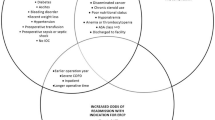Abstract
Introduction
The 30-day hospital readmission rate is a nationally recognized quality measure. Nearly one-fifth of medicare beneficiaries are hospitalized within 30 days of discharge, resulting in a cost of over $26 billion dollars annually. Endoscopic retrograde cholangiopancreatography (ERCP) remains the endoscopic procedure with the highest risk of morbidity and mortality. We set out to analyze the clinical characteristics predictive of 30-day readmission after an inpatient ERCP.
Methods
We performed a retrospective chart review of all inpatient ERCPs performed at our institution between 12/1/2014 and 9/30/2018. Clinical characteristics and outcomes of these patients were compared to determine predictors of 30-day readmission.
Results
A total of 497 inpatient ERCP procedures done for biliary or pancreatic indications, constituting 483 patients, were identified. There were 52 readmissions that occurred among 48 patients within 30 days of discharge. Basic demographic characteristics were similar between both groups. Comorbidities were significantly higher in those who were readmitted. Multivariate analysis revealed significantly greater odds of readmission with prior liver transplantation (OR = 4.15), cirrhosis (OR = 3.20), and pancreatic duct stent placement (OR = 2.56). Subgroup analysis for biliary indications revealed cholecystectomy before discharge and early ERCP to be protective against readmission.
Conclusion
A history of liver transplantation and cirrhosis are predictive of increased 30-day readmission rates after an inpatient ERCP. Pancreatic duct stent placement is associated with readmission; however, this phenomenon is likely related to stenting for pancreatic endotherapy. Cholecystectomy before discharge and early ERCP are predictive of decreased need for readmission in procedures done for biliary indications.
Similar content being viewed by others

References
Andriulli A, Loperfido S, Napolitano G, et al. Incidence rates of post-ERCP complications: a systematic survey of prospective studies. Am J Gastroenterol. 2007;102:1781–1788.
Freeman ML. Adverse outcomes of ERCP. Gastrointest Endosc. 2002;56:S273–S282.
Gottlieb K, Sherman S. ERCP and biliary endoscopic sphincterotomy-induced pancreatitis. Gastrointest Endosc Clin N Am. 1998;8:87–114.
Loperfido S, Angelini G, Benedetti G, et al. Major early complications from diagnostic and therapeutic ERCP: a prospective multicenter study. Gastrointest Endosc. 1998;48:1–10.
Leung JW, Chan FK, Sung JJ, Chung S. Endoscopic sphincterotomy-induced hemorrhage: a study of risk factors and the role of epinephrine injection. Gastrointest Endosc. 1995;42:550–554.
Freeman ML, Nelson DB, Sherman S, et al. Complications of endoscopic biliary sphincterotomy. N Engl J Med. 1996;335:909–918.
Nelson DB, Freeman ML. Major hemorrhage from endoscopic sphincterotomy: risk factor analysis. J Clin Gastroenterol. 1994;19:283–287.
Masci E, Toti G, Mariani A, et al. Complications of diagnostic and therapeutic ERCP: a prospective multicenter study. Am J Gastroenterol. 2001;96:417–423.
Cotton PB, Garrow DA, Gallagher J, Romagnuolo J. Risk factors for complications after ERCP: a multivariate analysis of 11,497 procedures over 12 years. Gastrointest Endosc. 2009;70:80–88.
Bergethon KE, Ju C, DeVore AD, et al. Trends in 30-Day Readmission Rates for Patients Hospitalized With Heart Failure: Findings From the Get With The Guidelines-Heart Failure Registry. Circ Heart Fail. 2016;9(6).
Bradley EH, Curry L, Horwitz LI, et al. Hospital strategies associated with 30-day readmission rates for patients with heart failure. Circ Cardiovasc Qual Outcomes. 2013;6:444–450.
Joynt KE, Jha AK. A path forward on Medicare readmissions. N Engl J Med. 2013;368:1175–1177.
Jencks SF, Williams MV, Coleman EA. Rehospitalizations among patients in the Medicare fee-for-service program. N Engl J Med. 2009;360:1418–1428.
Williams EJ, Taylor S, Fairclough P, et al. Risk factors for complication following ERCP; results of a large-scale, prospective multicenter study. Endoscopy. 2007;39:793–801.
Wang P, Li ZS, Liu F, et al. Risk factors for ERCP-related complications: a prospective multicenter study. Am J Gastroenterol. 2009;104:31–40.
Navaneethan U, Gutierrez NG, Jegadeesan R, et al. Delay in performing ERCP and adverse events increase the 30-day readmission risk in patients with acute cholangitis. Gastrointest Endosc. 2013;78:81–90.
Qayed E, Shah R, Haddad YK. Endoscopic retrograde cholangiopancreatography decreases all-cause and pancreatitis readmissions in patients with acute gallstone pancreatitis who do not undergo cholecystectomy: a nationwide 5-year analysis. Pancreas. 2018;47:425–435.
Nguyen GC, Rosenberg M, Chong RY, Chong CA. Early cholecystectomy and ERCP are associated with reduced readmissions for acute biliary pancreatitis: a nationwide, population-based study. Gastrointest Endosc. 2012;75:47–55.
Cotton PB, Eisen GM, Aabakken L, et al. A lexicon for endoscopic adverse events: report of an ASGE workshop. Gastrointest Endosc. 2010;71:446–454.
Shah R, Haydek C, Mulki R, Qayed E. Incidence and predictors of 30-day readmissions in patients hospitalized with chronic pancreatitis: a nationwide analysis. Pancreatology. 2018;18:386–393.
Aizawa T, Ueno N. Stent placement in the pancreatic duct prevents pancreatitis after endoscopic sphincter dilation for removal of bile duct stones. Gastrointest Endosc. 2001;54:209–213.
Orman ES, Ghabril M, Emmett TW, Chalasani N. Hospital readmissions in patients with cirrhosis: a systematic review. J Hosp Med. 2018.
Luthra AK, Patel KP, Li F, et al. Endoscopic intervention and cholecystectomy in pregnant women with acute biliary pancreatitis decreases early readmissions. Gastrointest Endosc. 2018.
Funding
No funding sources were used for this article.
Author information
Authors and Affiliations
Corresponding author
Ethics declarations
Conflict of interest
The authors declare that there is no conflict of interest.
Additional information
Publisher's Note
Springer Nature remains neutral with regard to jurisdictional claims in published maps and institutional affiliations.
Rights and permissions
About this article
Cite this article
Krill, T.S., Crain, R., Al-Saadi, Y. et al. Predictors of 30-Day Readmission After Inpatient Endoscopic Retrograde Cholangiopancreatography: A Single-Center Experience. Dig Dis Sci 65, 1481–1488 (2020). https://doi.org/10.1007/s10620-019-05870-6
Received:
Accepted:
Published:
Issue Date:
DOI: https://doi.org/10.1007/s10620-019-05870-6



